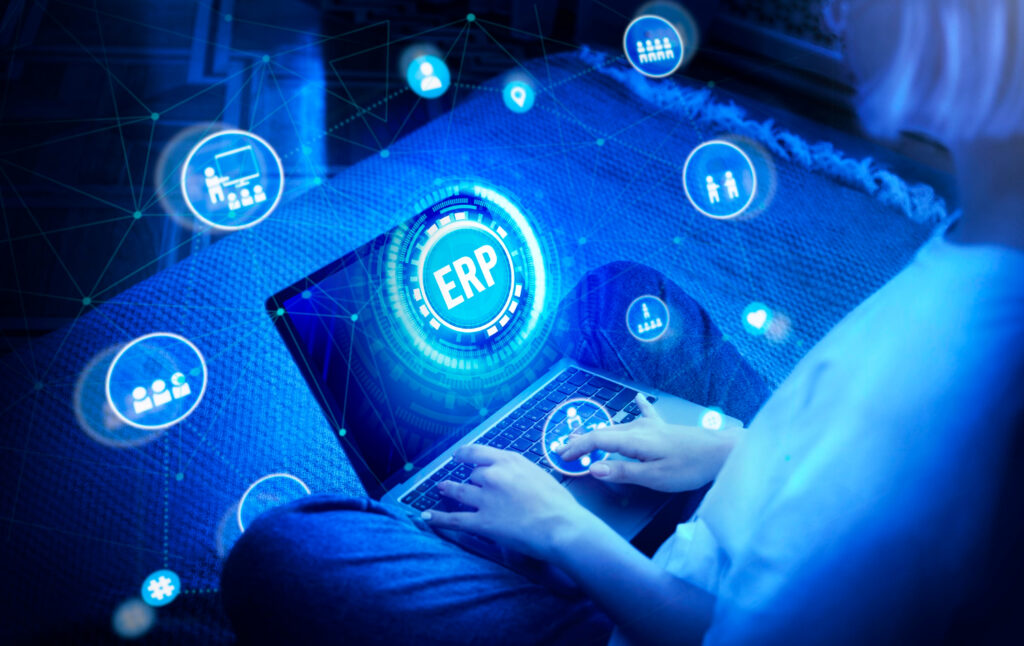The landscape of enterprise software is primarily shaped by two fundamental systems: Enterprise Resource Planning (ERP) and Customer Relationship Management (CRM). While distinct in their core functionalities, these systems form the backbone of modern business operations, each serving critical yet complementary roles in organizational efficiency. This analysis examines the nuanced differences between ERP and CRM systems, their respective capabilities, and the strategic advantages of implementing comprehensive ERP solutions.
What is ERP?
ERP, or Enterprise Resource Planning, is a comprehensive system designed to integrate and manage core business processes. It acts as the backbone of an organization by centralizing data and automating tasks across various departments. Here are the key features of an ERP system:
- Finance and Accounting: Manage budgets, forecasts, and financial reporting.
- Inventory and Supply Chain Management: Track stock levels, streamline procurement, and optimize logistics.
- Human Resources: Handle payroll, recruitment, and employee management.
- Manufacturing: Plan production schedules and monitor quality control.
By unifying these functions, ERP software provides businesses with real-time insights, reduces inefficiencies, and supports scalability.
What is CRM?
CRM, or Customer Relationship Management, focuses on managing interactions with current and potential customers. The primary goal of a CRM system is to improve customer relationships, increase sales, and enhance customer retention. CRM tools typically include:
- Lead Management: Track and nurture sales prospects.
- Sales Automation: Streamline the sales pipeline and close deals faster.
- Marketing Integration: Execute targeted campaigns and analyze their performance.
- Customer Support: Provide timely assistance and build customer loyalty.
While ERP systems address back-office functions, CRM systems focus on front-office activities related to customers.
ERP vs CRM: How Do They Compare?
1. Purpose
- ERP: Centralizes and streamlines internal operations, focusing on efficiency and data integration.
- CRM: Optimizes customer-facing activities, driving sales and enhancing customer satisfaction.
2. Scope
- ERP: Covers a wide range of functions, including finance, HR, inventory, and manufacturing.
- CRM: Primarily deals with sales, marketing, and customer support.
3. Data Management
- ERP: Provides a unified database for internal processes.
- CRM: Focuses on customer data and interaction history.
4. ERP vs CRM Benefits
- ERP:
- Improved operational efficiency.
- Reduced manual errors and redundancies.
- Enhanced decision-making through real-time analytics.
- CRM:
- Increased sales revenue.
- Better understanding of customer needs.
- Higher customer retention rates.
Advantages of ERP Software
Implementing an ERP system offers numerous benefits that can transform business operations. Here are the top advantages of ERP software:
1. Centralized Data Management
ERP systems eliminate data silos by consolidating information into a single source. This improves data accuracy and accessibility across departments.
2. Enhanced Efficiency
By automating repetitive tasks and streamlining workflows, ERP software reduces time spent on manual processes, allowing teams to focus on strategic initiatives.
3. Scalability
As businesses grow, ERP systems can adapt by adding new modules or functionalities to meet evolving needs.
4. Improved Decision-Making
Real-time analytics and reporting provide actionable insights, enabling businesses to make informed decisions quickly.
5. Compliance and Risk Management
ERP software helps organizations adhere to industry regulations and maintain accurate records, reducing the risk of non-compliance penalties.
6. Cost Savings
Although ERP implementation requires an upfront investment, it delivers long-term savings by improving resource allocation and minimizing waste.
ERP vs CRM: Which is Right for Your Business?
Choosing between ERP and CRM depends on your business goals and current challenges. Here are some considerations to help you decide:
When to Choose ERP
- You need to integrate multiple departments and systems.
- Your business faces inefficiencies in supply chain or manufacturing processes.
- Real-time data and analytics are critical for operations.
When to Choose CRM
- You want to improve sales performance and customer retention.
- Your marketing team needs better tools to target and track campaigns.
- Customer service is a priority for your business.
When to Use Both
For many businesses, ERP and CRM are not mutually exclusive. Integrating both systems, as seen in solutions like Odoo ERP, provides a comprehensive platform to manage internal processes and customer interactions seamlessly.
The Role of ERP in Modern Businesses
ERP systems have become indispensable tools for organizations aiming to stay competitive in a fast-paced environment. By addressing operational inefficiencies, improving collaboration, and providing a scalable infrastructure, ERP software supports growth and innovation.
Key Takeaways
- ERP systems focus on internal operations, while CRM systems enhance customer-facing activities.
- The integration of ERP and CRM can create a powerful solution for comprehensive business management.
- ERP software offers numerous advantages, including centralized data, improved efficiency, and better decision-making.
Ready to explore the possibilities of ERP software? Contact Mplus Software to learn more about how we can help implement the ideal solution for your business.


